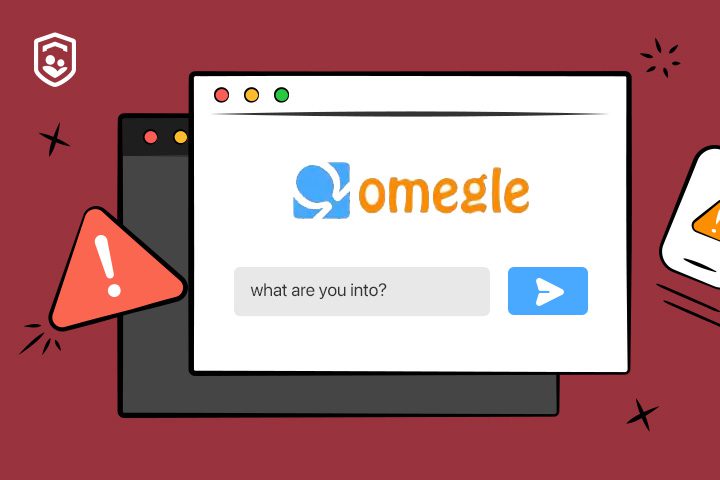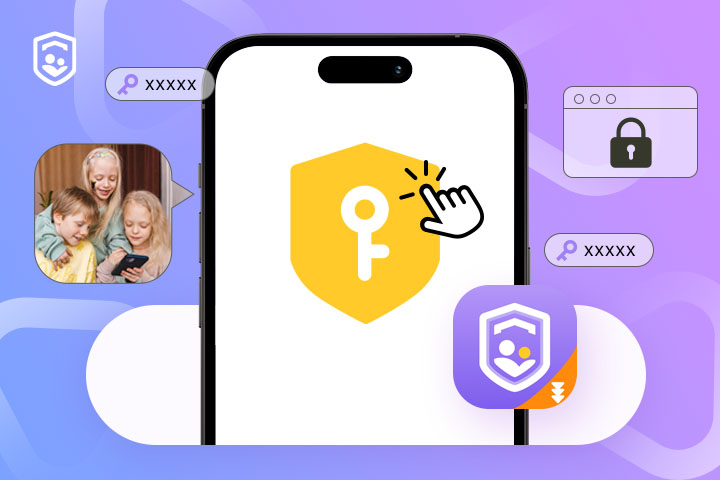Today, people live in a digital world, and it is easier to communicate with people worldwide through random chat. Social media apps and websites like Omegle have made it easier to connect with random strangers through texts and video calls. At the same time, it is crucial to realize the consequences of such platforms and possible negative aspects, such as critical views on the safety and privacy of users.
Why did Omegle get banned in 2023?
The random video chat platform ‘Omegle’ was banned in 2023 because it severely threatened users’ safety and privacy. Here are the detailed reasons that led to its ban. Knowing “what happened to Omegle” highlights the urgent necessity of protective measures and successful supervision of such websites.



Lack of robust moderation
The lack of moderation caused Omegle to become a platform filled with explicit and improper content, such as nude photos, porn links, and sexual texts, which are very dangerous.
Adult content appeared accessible in many cases without warning or checking for the user’s age. This puts younger audiences in a delicate position, as they will be exposed to unexpected materials that are quite sensitive to them.
Cyberbullying and harassment
In general, Omegle emerged as a platform for bullying where people can easily become targets of harassment and intimidation. Such interactions went uncontrolled. Cases of hooliganism and intimidation were rife.
Predatory behavior
Perverts misuse this anonymity given to the platform to target the youth online. There were many documented instances where the predators talked obscene content with the children or tried to get more private from them, like naked photos.
Regulatory scrutiny and public outcry
Increasing safety and privacy violations compelled regulatory entities to pay closer attention to Omegle. The platform’s failure to protect its users caused a public outcry. The pressure to regulate and the increasing concern and calls from the public for an improved safety experience online were the main causes for the ban of Omegle in 2023.
Safe video chats for kids powered by a smart parental control tool.
12 websites like Omegle for random video chat
Now that Omegle has shut down, users are looking for similar platforms offering random video calls. Below are twelve popular options, all of which have different characteristics, disadvantages, safety concerns, and appropriateness for users of a specific age.
1. OmeTV
OmeTV has gained increasing popularity as one of the best ways to meet someone new, make friends, and date. Its simple and intuitive design allows users to quickly communicate with strangers through video calls. Users can access it both as an application and a website.
Nonetheless, moderation is not perfect and can sometimes involve accidentally bumping into sexually explicit content. Some users indicated a higher rate of such incidents than other sites, which can be frightening to newcomers. The safety level is average, and the app is designed for users over 18 years old.
2. Monkey
Monkey, a free random video chat platform, allows users to chat with random strangers on certain topics, making the conversation more interesting. It has both video and text chat services to enhance the flexibility with which users engage each other. However, these features may sometimes make it difficult to find matches, thus causing a bit of delay.
There is still a high likelihood of getting toxic content because there isn’t much censorship, particularly for user age and posts. The safety level is low, and there is an 18+ age requirement.
3. Omegle. site (New)
The new Omegle. The site has been redesigned with improved safety measures and proper moderation. Text and video chat are available, allowing users to select the desired mode of communication. Nevertheless, as a new platform, it may have challenges in terms of the number of users and functionality. Its new moderation policies have not been thoroughly tried; thus, the safety level is moderate and contains adult content, 18+.
4. Chatous
Chatous unites people from different countries and allows sharing of photos and videos. The interactions are more relevant since users are matched based on their interest in similar content. It is necessary to create an account, which may discourage some people from seeking an opportunity to make a connection immediately. However, even with interest-based matching, the possibility of stumbling on forbidden material remains. The safety level is medium, and they only allow persons 18 years and above.
5. Chatroulette
Chatroulette provides video connections with strangers and includes a preference choice option. Registration is not required, meaning one can start chatting right away. However, the platform has issues with sexual exploitation since it is not tightly monitored, and one is likely to come across sexual harassment or CPA material. The security level is low, and the content is restricted to users 18 years and above.
6. YouNow
YouNow is a live stream and interaction-based platform on which users can stream what they are doing and interact with spectators. They can also create content, which makes it different from random chat websites like Omegle or Chatroulette. Nevertheless, the platform may be confusing for new users, and, in addition, it is possible to come across obscene broadcasts. It can be considered safe, with the minimum age rating for the content being 13+.
7. ChatHub
This site offers an opportunity to chat randomly using webcams and has options for choosing partners by their gender or the country they live in. They include text and video call features and do not need to sign up, which makes it perfect for a quick call. However, it still lacks strict moderation, so users may come across immoral content. The safety level of the site is average, and it is only accessible to individuals 18 years and above.
8. EmeraldChat
The rules and regulations governing the EmeraldChat are strict to ensure that all the people are safe while chatting. It provides interest-based chats, making conversations more personalized. However, account creation is needed, and while it strives for a high safety level, there are moderation issues. Besides, it’s announced that the platform is restricted to individuals 18 and over.
9. MeetYou.Me
MeetYou.Me is all about making new friends through random video chats. Text and video chat are available on the platform, which is designed simply. As it operates relatively recently, it has fewer users, which could impact the number of matches available.
The moderation is fairly sound in that it seeks to offer participants a safe space. The safety level can be considered moderate, and the contents of the app are available only to adults over 18 years old.
10. Chitchat
Chitchat offers very basic options for making casual connections with random people. It has provided interest-based chat rooms to increase the applicability of communication. However, some elements, such as the platform’s simplicity and user activity variability, may decrease the overall enjoyment. Moderation is attempted but often not sufficiently. The safety level is moderate due to the 18+ age limit for players.
11. FaceFlow
FaceFlow features video calls, group chat, file sending, etc. As it offers a more social experience, it requires users to create an account, which could be a drawback for some users looking for anonymous socializing and quick relationships. Even though the platform is moderated, there is still a possibility of coming across pornographic material. The safety level is moderate since there is an 18+ age requirement to be able to play on the site.
12. CamGo
CamGo is a simple application for video communication with strangers that includes choosing the gender of the talker. The site is easy to navigate, though there is little moderation, which makes the site unsuitable for little ones due to pornography. The safety level is low, and it contains age restricting factor of 18+.
Dangers of sites/apps similar to Omegle for kids
While we know those random chat platforms are not for minors, More and more millennials are flocking in large numbers because of trends and curiosity. Here are the dangers of websites/apps similar to Omegle that parents must know about, presented in points, with each point elaborated in a paragraph.
- Exposure to explicit content
The enforcement of rules on such sites is also very weak, and users can easily encounter nudity and related content, and the consequences are likely to be psychologically pernicious.
Child predators can utilize the anonymity of random chat websites for enticement and stalking. They make sexual remarks, ask for a date or phone number, and try to organize face-to-face contact with the child. The absence of efficient and strict age verification systems on online platforms allows minors to access them. Various scoundrel target little ones and jeopardize their security and welfare.
- Cyberbullying
On random chat websites, there is no accountability for the actions performed by the users. Hence, negative behaviors such as cyberbullying are fostered. A child can be bullied through words or threats and harassed, which in the long run causes mental problems. Websites such as Omegle foster bullying and, as a result, lead to a toxic environment that will negatively impact children.
Due to these risks, parental monitoring is crucial when it comes to children’s internet usage. It is high time parents educate themselves on the various social media apps their children are using, set certain restrictions, and apply the most efficient software solutions.
Tips for a safer online world for your kids
It is also very important to make sure your child is safe online. Imagined conversations on the risks involved in communicating with strangers and creating freedom of speech can equip a child with the right decisions and responses in handling the complex world of technology. Here are three essential tips to promote kids’ safety online, especially on websites similar to Omegle, along with a recommended parental control solution – FlashGet Kids.



Educate about talking to strangers
Clarify to your children that it’s unsafe to approach strangers on the Internet. Highlight the fact that one should never tell anyone their full name, address, phone number, or any information about the school one attends. Teach them to be wary and ask for permission whenever they want to interact with strangers or someone they do not know.
To address the “talk to strangers” issues, use a parental control solution like FlashGet Kids to monitor their communications, track their notifications, and prevent them from accessing dangerous sites and apps. It also offers an app blocker to help you lock dangerous apps on kids’ phones.
Establish clear online rules and boundaries
Ensure that your child abides by the rules and restrictions concerning his/her Internet use. Set rules concerning time spent using devices, the nature of websites and applications, and the manner of usage. Try to maintain good communication with the child so they are free to share their online experiences with you and any issues they may be experiencing.
The parental control features in FlashGet Kids will enable parents to set these rules, manage their screen time, and live monitor their online activities to ensure compliance.
Teach critical thinking and online privacy settings
Help your child develop critical evaluation skills so they can appropriately assess the content they find on the internet. Make them read to critically assess information, check sources, and avoid being victims of scams or frauds. Teach them the best practices for protecting themselves online, such as selecting robust passwords, not sharing personal information on social media platforms, and being wary of phishing scams.
Conclusion
Random chat services on websites like Omegle can be entertaining and more communicative, but they are also dangerous, particularly for juveniles. New technologies and possible dangers may appear as the child grows, and parents need to be aware of these changes. Closer communication with your child and normal guidance and monitoring can make their digital lives safer. Bear in mind that if you are informed and act proactively, you have the best shield for your children against what they may encounter on the internet.

